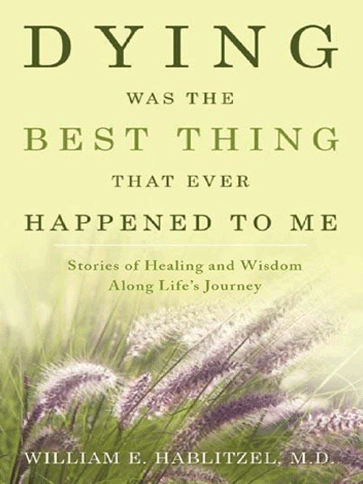DYING WAS THE BEST THING THAT EVER HAPPENED TO ME
Stories of Healing and Wisdom Along Life’s Journey
William E. Hablitzel, MD
 This book will come as a surprise to many people who have not experienced the spirituality of a physician. Dr. Hablitzel’s belief in miracles and a higher power comes as no surprise to me, however, having been told a number of years ago by the surgeon who performed the triple bypass on my husband, “It was worse than we thought. It’s now all up to him and….” He knew I knew he meant God. I suppose being a scientist he was reluctant to name this higher power.
This book will come as a surprise to many people who have not experienced the spirituality of a physician. Dr. Hablitzel’s belief in miracles and a higher power comes as no surprise to me, however, having been told a number of years ago by the surgeon who performed the triple bypass on my husband, “It was worse than we thought. It’s now all up to him and….” He knew I knew he meant God. I suppose being a scientist he was reluctant to name this higher power.
Dr. Hablitzel in this beautifully written self-help motivational first book with a carpe diem theme (Do not put off for tomorrow what you can do today), readily acknowledges the existence of a higher power, God, in the scheme of life. He tells the story of lessons learned from his patients, how many of them did not know how to live until they were near death, or in the case of the title story, actually experienced death.
Until Alexander Kipton experienced full cardiac arrest, he had never really taken time to enjoy life: Alex Kipton found uncertainty through death. It was the best thing that ever happened to him, not because he got a second chance for life, but because he began experiencing life for the first time. With the uncertainty of tomorrow, he learned to make use of each day, and in all of those days he found meaning and happiness.
Each of the other twelve chapter titles is either a summation of a patient’s experience or a direct quote from a patient, one or more of the many teachers in the form of patients his practice of medicine brought to him: this doctor was changed by his patients; his patients were changed by him.
Carol, another of his patients, was diagnosed with a terminal illness. She had been too busy to marry her fiance of many years, but when faced with her mortality, having been diagnosed with aneurysms on the brain, she threw caution to the wind and planned to get married the next day and travel. When told that the neurosurgeons didn’t think she needed to stay in the hospital—but they do want you to think about going to the specialty center in Baltimore as soon as possible. They might have something to offer that we don’t—Carol smiled and said, “Thanks, but maybe later. First, Troy and I are getting married—tomorrow. Then we are going to travel. We don’t know where, or for how long.” Later, she tells her doctor, “When you always have tomorrow, it’s too easy to waste today. I’ve spent so much time looking ahead that I couldn’t see happiness right in front of me.”
A medical doctor at peace with himself, who in spite of science is able to experience and embrace the spiritual, has given a profound insight into the examination, prognosis, and care required for healing of most of his patients. Other patients who had bad news coming were treated with the caring that made the next step easier to bear, even when the next step was death.
“There are no coincidences” was quite a unique way of expressing the power and relationship of God in our daily lives. The peace on the faces of those who were dying knew of God’s peace. The meaning and role of religion in living, in sickness, and in dying proved to be most valuable in the stories of this book. The reader is given a new appreciation for the beauty of life, the creation, and the Creator. The value of listening, forgiving, living now ( carpe diem ), and the power of prayer are extraordinary lessons presented in the stories.
This book is a must read, especially if you yourself or a loved one is faced with a serious illness. Were it not for my personal experience, I would probably have found it hard to believe that a scientist—a medical doctor—could be so spiritual, and as a result, so compassionate.
Contributing to this review is my brother-in-law Linon Loyd, who was here during the death of my younger brother. He picked up the book and could not put it down until he finished. We predict a best seller.
Reviewed by Lee L. Peoples